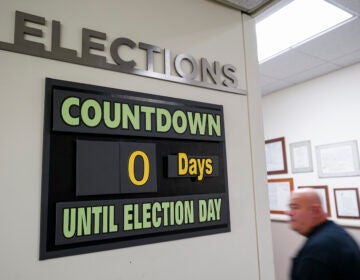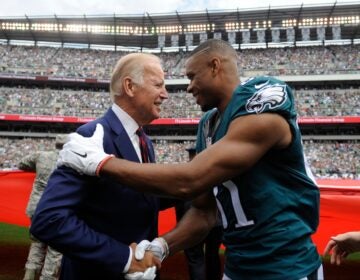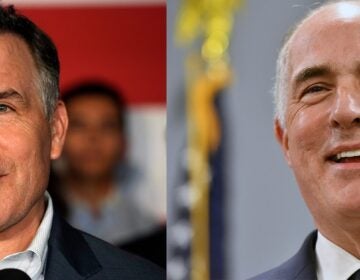Williams to restaurant owner who was deputized after gifts: ‘Have you flashed your badge lately?’
Philadelphia restaurant owner Mike Weiss was a “super friend” of Seth Williams, or at least that’s what the city’s district attorney regularly called Weiss in text messages.
The super-charged relationship first kicked off in 2009, when Weiss met Williams through a mutual friend during a trip to a Center City cigar shop.
“We got along. We talked about politics,” said Weiss, who owns Woody’s, Voyeur and other popular bars while testifying at Williams’ federal corruption trial, which entered its fifth day on Monday. “We talked about running for office. I had offered to donate to his campaign. We became friends. We hung out together.”
That amicable connection transformed into something grander with time. Weiss began to finance trips to Florida, San Diego and Las Vegas for Williams and his then-girlfriend Stacey Cummings. Weiss provided Williams with cash loans and a red 1997 convertible Jaguar for Cummings, who was unemployed at the time and needed a car to get around to look for work. On another occasion, Weiss paid for one of Williams’ daughters to go to Key West for spring break upon the district attorney’s urging.
In exchange, Williams provided Weiss with things like a police report stemming from an incident involving a friend of Weiss, and Williams would write him letters of recommendation when Weiss needed them.
Williams also had the district attorney’s office issue Weiss an official badge after appointing the restaurateur as a special advisor to the office focusing on LGBT issues.
“Have you flashed your badge lately?” Williams texted Weiss after giving him the credential, according to evidence presented at the trial.
On Monday, jurors in the corruption trial of Williams heard from Weis, a central witness against the city’s top prosecutor. Authorities allege he heaped Williams with free trips and other gifts in return for official acts.
To federal prosecutors, Weis represents the second witness to whom Williams sold the power of the office. Both wealthy givers, authorities say, are proof that the scandal-plagued district attorney traded his public office for personal enrichment.
Prosecutor Eric Moran asked Weiss if the gifts were directly in exchange for access to power.
“In part,” Weiss replied.
The trips were so frequent that Weiss at times could not recall the precise frequency. When Moran wondered how many times he paid for plane tickets for Williams to go to San Diego, Weiss said, “three, or four? It could have been five. Not exactly sure.”
While Weiss was furnishing Williams with plane tickets, he encountered some troubles of his own.
Weiss was sentenced to three years’ probation by a federal judge after pleading guilty in November 2010 to a tax crime. Investigators had been probing Weiss and one of his businesses, the Palmer Social Club, for filing false federal tax returns.
As part of his punishment, Weiss had to complete 300 hours of community service and wear an ankle bracelet during house arrest for the first year of his probation.
Weiss, who is under a court order to testify in the trial, was at times testy as he described to the jury some of the gifts that prosecutors say bought him the special advisor appointment.
Among them, the Jaguar.
After learning that Cummings needed a car, he said he would look around for her, but she was keen on the decades-old Jaguar, so Weiss said she could take it for a couple of weeks.
Not long after, Williams sent Weiss an email cataloging issues with the car that were identified after Williams brought it to an auto shop. The Jaguar needed new brakes, a new engine and had a hood dent, among other problems. Completely fixing the vehicle would cost thousands of dollars.
“These are the facts laid out to us by the mechanic,” Williams wrote in an email to Weiss from the district’s attorney’s Yahoo email account.
Cummings family would pay for the Jaguar to get fixed up. Weiss did not object, presuming the car was no longer his.
But even with a car, Cummings had trouble finding work. In one text Williams wrote to Weiss, he said: “I need to get Princess Stacey a job.”
Weiss promised to put out some feelers.
In later months, the romance between Cummings and Williams would sour dramatically.
Last August, Cummings, who has been named as a potential witness in the trial, pleaded guilty to slashing the tires on two city-owned vehicles outside of Williams’ home.
‘This didn’t feel right’
After 36 years in law enforcement, Philadelphia Police Department Deputy Commissioner Joe Sullivan has a pretty good sense when something is fishy.
“I don’t always know why,” Sullivan told the court on Monday. “But I know when I’m uncomfortable, and this didn’t feel right.”
Sullivan is referring to a 45-minute meeting he had with Williams and wealthy Bucks County businessman Muhammad Ali at the swanky Union League of Philadelphia in 2012.
Before arriving, Sullivan switched into his most formal police uniform, thinking flashy attire would send the signal that the gathering was not a clandestine affair.
“I wanted to make sure people would see me enter and see me leave,” Sullivan testified.
He’s not an uncommon sight at the members-only club, but mostly because he has attended many functions there. Sullivan himself was not a member. “I don’t make that kind of money,” he told the court.
Over soup, Sullivan listened to Jordanian-born Ali describe how much he loves the United States and the dismay he expressed over why he was being hassled he was experiencing at the Philadelphia International Airport after returning home from trips abroad. Ali thought he was the target of racially biased screenings.
At that point, Sullivan started to wonder why he was there. Ali’s story of being subjected to additional airport screenings is something Ali and Williams have talked to Sullivan about before. Sullivan testified that he went to the meeting assuming he would be offered some new information about Ali’s plight, but nothing new proffered.
“I felt like there was some type of performance that I was a part of,” Sullivan told the jury. “It didn’t make sense that we had rehashed everything he had rehashed from the beginning.”
Shortly after leaving, Sullivan reported the meeting with Williams and Ali to the Federal Bureau of Investigation and the advice back to him could not have been more clear.
“Stay away from Mr. Ali was the advice,” said Sullivan, who then called Williams to say the same. “He needs to stay away from Mr. Ali.”
Unknown to all three men was that federal investigators were probing the business practices of Ali, who ran a multi-million-dollar prepaid cellphone card company.
Prior to the get-together, Sullivan had ordered a police escort to monitor whether Ali would have to endure a secondary airport screening after returning back from a Caribbean trip he was on with Williams.
When Ali passed through airport security without undergoing a second layer of screening with the police escort, Ali was grateful, offering to take Sullivan out to dinner with Williams in exchange.
Sullivan described the Williams-ordered police escort an “uncommon” arrangement.
Once federal investigators told Sullivan to keep away from Ali, no such assistance happened again.
Sullivan said: “We were no longer going to be involved in this situation.”
WHYY is your source for fact-based, in-depth journalism and information. As a nonprofit organization, we rely on financial support from readers like you. Please give today.




